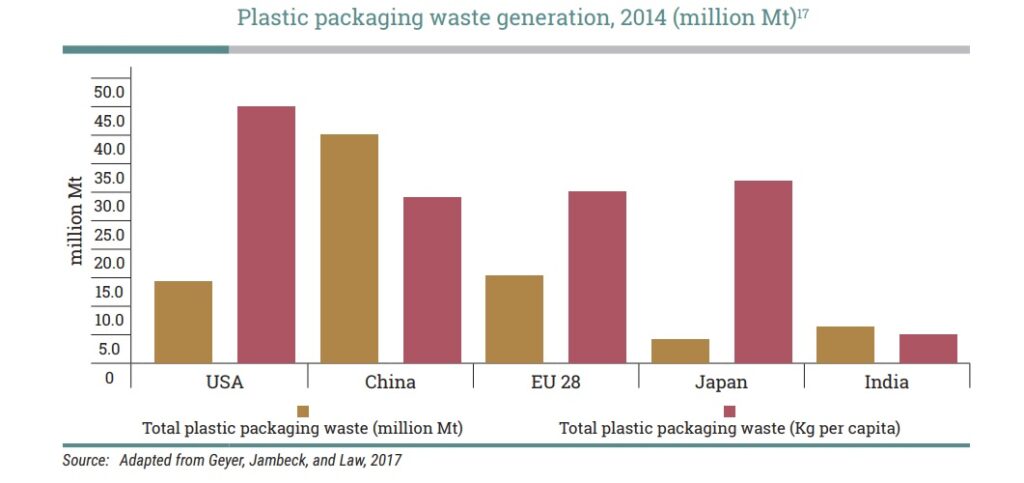Dependency on plastic in day to day life in not uncommon, it is being utilized in almost all aspect of daily life. In India, approx. The benefits of plastic are undeniable. The material is cheap, lightweight and easy to make. These qualities have led to a boom in the production of plastic over the past century. Most plastics do not biodegrade. Instead, they slowly break down into smaller fragments known as microplastics. Studies suggest that plastic bags and containers made of expanded polystyrene foam (commonly referred to as “Styrofoam”) can take up to thousands of years to decompose, contaminating soil and water. The most common single-use plastics found in the environment are, in order of magnitude, cigarette butts, plastic drinking bottles, plastic bottle caps, food wrappers, plastic grocery bags, plastic lids, straws and stirrers, other types of plastic bags, and foam take-away containers. These are the waste products of a throwaway culture that treats plastic as a disposable material rather than a valuable resource to be harnessed.
What is Single us Plastic:
As per UNEP (United Nation Environment Program) Single-use plastics, often also referred to as disposable plastics, are commonly used for plastic packaging and include items intended to be used only once before they are thrown away or recycled. These include, among other items, grocery bags, food packaging, bottles, straws, containers, cups and cutlery.
Practise of Single use plastic in India:
In India, usage of single use plastic, is being done for all most everything. In terms of usage, the synonyms of carry bag mean Plastic Bag. Almost 15, 000 tonnes of plastic waste are generated every day, out of which 9, 000 tonnes are collected and processed/recycled. However approx. 6, 000 tonnes of plastic waste are not being collected. The uncollected mass of these plastic waste further worsens the environment by various long-term adverse impact. example;
a) Adverse impact on aquatic animals when thrown into water
b) Adverse health impact on Animals who at times chew the same with other solid wastes
c) Choke the sever and drain
d) Reduce the natural capacity of percolation of rain water through soil
e) Most of the plastics and non-biodegradable. It remains in soil for many years and reduce the natural fertility

Calling Ban on Single use plastic has welcomed in India as government has taken initiative to prevent its manufacturing and usage. Although the complete and detailed plan is not yet shared amongst people. The first and best approach of managing environmental pollution is to make people aware about the adverse impact of plastic usage. Government has successfully done the same by taking a good initiative to minimize its usage and then eliminate the same in coming days.
In parallel with government, role of citizen is equally important in this mission. This can be done by following mean of voluntary activity;
a) Educating people about Environment, Making aware the adverse impact of plastic
b) Avoiding the usage of plastic in routine life by alternate means; example Carrying jute bag, cloth Bag with us in Market rather then asking Plastic carry bag
c) Source segregation of Waste, by this it can be sent for processing/recycling
d) Used cloth/Old Cloth can be utilized or promoted for preparation of carry bag
e) Stop throwing wastes in open or water

